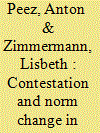| Srl | Item |
| 1 |
ID:
185245


|
|
|
|
|
| Summary/Abstract |
Elephants and whales took center stage in the environmental movements of the 1980s. As flagship species, they were the poster children of global initiatives: international ivory trading and commercial whaling were banned in the 1980s in the context of the Convention on International Trade in Endangered Species of Wild Fauna and Flora (CITES) and the International Whaling Commission (IWC), respectively. While the conservation of both species is contested, we observe a change of existing norms in one case but not in the other: A moratorium on commercial whaling remains in place. Meanwhile, a limited shift to sustainable use regarding ivory was passed in 1997/2000. We ask why norm change occurred in one case but not the other, given their similarities. We argue that the difference can be explained by the perceived legitimacy of the claims of norm challengers using arguments of “affectedness” and the breadth of issues covered by CITES. In contrast, other factors commonly discussed in norms research do not explain this puzzle: the relative power and strategies of norm advocates and challengers, and the degree of legalization. This shows the interplay of discursive aspects and concrete institutional opportunities for norm change, even in the face of otherwise inopportune conditions.
|
|
|
|
|
|
|
|
|
|
|
|
|
|
|
|
| 2 |
ID:
138102


|
|
|
|
|
| Summary/Abstract |
Why did Japan begin scientific whaling, a policy that benefits few domestically and alienates many around the world? In this essay, I argue that Japan’s scientific whaling regime was formed as a result of a ‘two-level game’ between President Reagan and Prime Minister Nakasone. Although Reagan was faced with a unified, anti-whaling Congress, he himself was not much concerned about the issue. Nakasone was also not particularly concerned about whaling, and he initially was faced with a Diet that was divided on how to deal with whaling (although it became less divided over time). Ultimately, these circumstances led Japan to develop the scientific whaling regime that persists to this day.
|
|
|
|
|
|
|
|
|
|
|
|
|
|
|
|